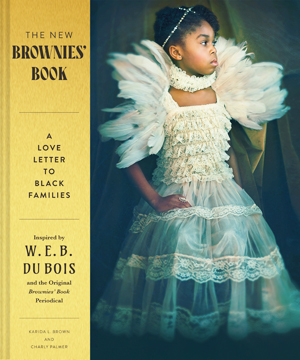c.2023, Chronicle Books
$40.00
208 pages
By Terri Schlichenmeyer
The Truth Contributor
The kids are back in school now and already, your family’s going in six different directions.
You’re busy, between sports, extracurricular activities, work commitments, family gatherings, and community activity. If there was a meaningful way to get everybody together at once, you’d be all over that so grab The New Brownies’ Book by Dr. Karida L. Brown and Charly Palmer and take a hint from Grandma’s time.
Ten years after the launching of the “infamous The Crisis magazine,” W.E.B. Du Bois, Augustus Granville Dill and Jessie Redmon Fauset had another idea: they called it The Brownies’ Book, though it was really a magazine that sold for less than two dollars for six issues, or 15 cents for a single issue. It was 1920, Jim Crow laws were in effect, and their intention was that the publication would “serve as a much-needed medium for Black and brown children,” by showing them what people of color had contributed to the world. It was also something white families could use and learn from, too.
“… it was,” say Brown and Palmer, “a crown jewel of African American children’s literature.”
This book, meant to “evoke the spirit of… [the] original Brownies’ Book,” pulls together dozens of original stories, poems, plays, essays, lessons, and artwork that mirrors what Du Bois had initially intended more than a century ago.
Here, you’ll find tales of ancestors and why it’s important to know yours. You’ll find games for the whole family to play, including even the littlest kids. You’ll find photos and reproductions of Brownies’ Book pages from the 1920s and new artwork from a variety of Black artists. There’s humor in some of these stories, and one is a fun challenge for pre-teens. There are tales for older kids here, pages that help teach morality and empathy, stories to read aloud to a grade-schooler, stories that seem to end abruptly but that beg for meaningful discussion, and biographies of “she-roes” and other giants in Black history…
Absolutely, The New Brownies’ Book lives up to its subtitle: it is, indeed, “a love letter to Black families.” It’s also pretty sweet on art and poetry, too.
Many of the essays and stories, though, may confound readers who are not prepared for their abrupt endings. It’s as if the pages have run out and that’s that – but look again. Those ends-too-quickly tales invite a child to imagine what happened next or to think of a better storyline. They are ready-made to teach a child to be a storyteller, and for families to discuss.
Don’t think that this book is only for small children, though. This is the kind of reading that you can leave around for a teenager to find and browse, to provoke thoughts and spark ideas. There are inspirations inside here, as well as subtle lessons.
You can feel comfortable giving this to a family, new, old, or blended. It would be a great gift for your favorite babysitter or a grandparent, too. For your household, The New Brownies’ Book is a great direction.

